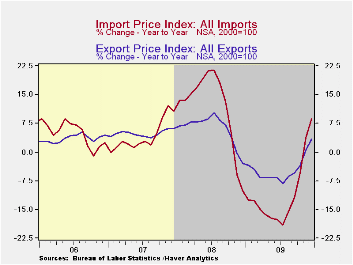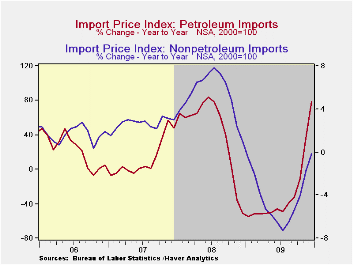 Global| Jan 14 2010
Global| Jan 14 2010U.S. Import Prices Are Stable As Oil Costs Slip
by:Tom Moeller
|in:Economy in Brief
Summary
The yearend weakness in oil prices was modest but enough to hold overall monthly import prices stable. The zero change in December import prices matched Consensus expectations. For the year as whole, however, the picture was more [...]
 The yearend
weakness in oil prices was modest but enough to hold overall monthly
import prices stable. The zero change in December import prices matched
Consensus expectations. For the year as whole, however, the picture was
more dramatic. Import prices fell 11.5% in 2009 and that reversed the
2008 increase. Excluding petroleum, import prices fell 4.1% last year
and reversed most of the 2008 increase.
The yearend
weakness in oil prices was modest but enough to hold overall monthly
import prices stable. The zero change in December import prices matched
Consensus expectations. For the year as whole, however, the picture was
more dramatic. Import prices fell 11.5% in 2009 and that reversed the
2008 increase. Excluding petroleum, import prices fell 4.1% last year
and reversed most of the 2008 increase.
Petroleum prices slipped 2.0% last month following their 6.3% November increase. For the year overall, the decline in prices reversed the climb in 2008. That pattern masks, however, extreme volatility during the year. By yearend, petroleum prices had nearly doubled the January trough. This month, Brent crude oil prices have strengthened further to nearly $80 per barrel from a low just above $71 last month.
In addition, the
latest report from the U.S. Bureau of Labor Statistics indicated that
non-oil import prices rose 0.5% after a similar gain during November.
The lower value of the dollar has now helped lift these prices at a
6.8% annual rate during the last three months, reversing a 7.3% y/y
decline as of July.  (During the last ten years, there has been a
negative 81% correlation between the nominal trade-weighted exchange
value of the US dollar vs. major currencies and the y/y change in
non-oil import prices.)
(During the last ten years, there has been a
negative 81% correlation between the nominal trade-weighted exchange
value of the US dollar vs. major currencies and the y/y change in
non-oil import prices.)
Excluding petroleum, last year prices reversed most of the 2008 increase and the decline breaks down as follows: Prices for iron & steel mill products fell 28.5% and reversed all the 2008 increase. Chemical prices fell 12.4% after a 24.0% 2008 increase. Food & beverage prices slipped 2.8% after a double-digit 2008 gain. Prices for nonauto consumer goods were weak and slipped 0.3% after a 2.8% increase. That decline reflected a 0.6% decline in durable consumer goods prices which reversed strong gains in the prior two years. Home entertainment equipment prices fell 4.1% last year and extended a decline dating back to 1996. Furniture prices nudged up 0.6% after a 7.1% 2008 increase. Finally, apparel prices slipped 0.1% after strong gains in 2007 and 2008.
Total export prices fell 4.6% last year following strong gains dating back to 2003. The decline reflected a 12.8% drop in agricultural export prices and a 3.7% drop in "non-ag" prices. These declines reversed just some of the strength through 2008.
The import and export price series can be found in Haver's USECON database. Detailed figures are available in the USINT database.
Risks to Sustained Economic Recovery (With Lessons Learned from Winston Churchill and Teddy Roosevelt) from the Federal Reserve Bank of Dallas can be found here.
| Import/Export Prices (NSA, %) | December | November | October | Y/Y | 2009 | 2008 | 2007 |
|---|---|---|---|---|---|---|---|
| Import - All Commodities | 0.0 | 1.6 | 0.9 | 8.6 | -11.5 | 11.5 | 4.2 |
| Petroleum | -2.0 | 6.3 | 2.4 | 78.4 | -35.9 | 37.7 | 11.6 |
| Nonpetroleum | 0.5 | 0.6 | 0.5 | -0.2 | -4.1 | 5.3 | 2.7 |
| Export - All Commodities | 0.6 | 0.9 | 0.0 | 3.4 | -4.6 | 6.0 | 4.9 |
Tom Moeller
AuthorMore in Author Profile »Prior to joining Haver Analytics in 2000, Mr. Moeller worked as the Economist at Chancellor Capital Management from 1985 to 1999. There, he developed comprehensive economic forecasts and interpreted economic data for equity and fixed income portfolio managers. Also at Chancellor, Mr. Moeller worked as an equity analyst and was responsible for researching and rating companies in the economically sensitive automobile and housing industries for investment in Chancellor’s equity portfolio. Prior to joining Chancellor, Mr. Moeller was an Economist at Citibank from 1979 to 1984. He also analyzed pricing behavior in the metals industry for the Council on Wage and Price Stability in Washington, D.C. In 1999, Mr. Moeller received the award for most accurate forecast from the Forecasters' Club of New York. From 1990 to 1992 he was President of the New York Association for Business Economists. Mr. Moeller earned an M.B.A. in Finance from Fordham University, where he graduated in 1987. He holds a Bachelor of Arts in Economics from George Washington University.






